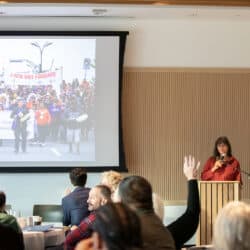Volunteering is an amazing thing, but it remains an area of unharnessed potential, replete with missed opportunities to build connections across social groups.
April is a big month for volunteering.
That is because it is home to National Volunteer Week in Canada – a time to recognize the millions of volunteers who make their communities a better place and to celebrate volunteering itself.
And there is good reason to do so. Research shows that volunteering is one of the most powerful forms of enrichment. Among young and old, it increases life satisfaction, self-esteem, happiness, and physical health, with evidence even suggesting that it extends the lifespan. It expands social networks, increases self-understanding, and leads to the acquisition of new skills and career opportunities.
Corporate volunteering programs, in which employees substitute volunteerism for a certain number of work hours, also increase employee engagement, productivity, and retention.
Not only do volunteers reap the benefits, society is better for it. In Canada, volunteering adds an estimated $56 billion to the economy per year, and two billion hours of service are volunteered annually to charities, non-profits, and organizations that address some of the biggest needs in the community.
The importance of volunteers will not be lost to anyone involved in managing a non-profit organization, and having been there myself, I owe many thanks to dozens of volunteers who stepped up to fill roles we simply could not have filled otherwise.
While volunteering brings tremendous benefits to individuals and communities, it remains largely a practice of privilege.
But there is another aspect of volunteering, and of who volunteers, that is too often overlooked.
While volunteering brings tremendous benefits to individuals and communities, it remains largely a practice of privilege. People of colour, low-income individuals, people with disabilities, and newcomers all volunteer at lower rates than the general population, missing out on the benefits of volunteering and opportunities to contribute to their communities. When they do volunteer, they are more likely to become “ghettoized” into organizations specific to their membership in a marginalized group, such as people with a disability volunteering for disability organizations.
Why does this happen?
It is not because they lack the drive to help or because they have narrow interests; what it does reflect is the existing gaps in social, human, and economic capital.
For one, volunteering comes with costs. There are expenses for travelling, spending time away from work, and childcare, all of which are harder to bear for low-income individuals, especially since money is not coming in through their volunteer work. After all, how can someone dedicate their time, energy, and resources to volunteering when it takes everything they have to stay afloat themselves?
While there are corporate volunteer programs in which employers support employees in pursuing volunteerism, these are largely a white-collar phenomenon practised among organizations whose members are more likely to volunteer anyway.
Volunteer opportunities are also disproportionately advertised to people with larger social networks, professional memberships, and access to technology. This further slants the process toward people with higher incomes, education levels, and social status, as do role requirements like computer and accounting skills, or experience as a board member.
Everyone loses – both those who could have benefited from volunteering and the organizations and communities they could have helped serve.
Since people are also more likely to volunteer if they know someone already doing so, the volunteer pool becomes further skewed toward those who are relatively well off.
This creates a feedback loop that reinforces existing barriers while creating an atmosphere that can be unwelcoming, unfamiliar, and alienating for volunteers who do come from outside the usual circles. The result is that everyone loses – both those who could have benefited from volunteering and the organizations and communities they could have helped serve.
For non-profit leaders and policy-makers, there is no excuse for letting this continue; it is neither effective for operations nor consistent with equality, inclusion, or diversity – values that many of them endorse.
The following changes, among others, should be made to fully harness the power of volunteering.
There must be greater opportunities for people of all backgrounds to offer their experiences, skills, and talents.
As an overarching measure, public health, education, and policy practitioners should rebrand volunteering as a physical- and mental-health practice, not merely as a civic duty or contribution to the community.
There must also be greater opportunities for people of all backgrounds to offer their experiences, skills, and talents – as well as for them to acquire these. This means removing barriers to volunteering through more widely advertising volunteer opportunities, providing stipends for travel or childcare, being flexible about duties and hours, and ensuring accessibility for people with disabilities.
To support this, more public funding opportunities should be available to organizations with approved proposals for making their volunteer programs inclusive and easier to access.
Opportunities for training and developing skills needed for volunteer positions should be offered as part of the role, so that potential volunteers who are capable but lack experience are given a chance to develop their abilities and meet the requirements.
Organizations should also make it a goal to recruit volunteers fluent in languages other than English – such as Mandarin, Punjabi, or Farsi – who can provide extra support to newcomers looking to help their communities while also assisting with recruiting efforts in these networks.
And if organizations are serious about inclusion and getting the most of their volunteer programs, they must honestly judge their own performance in making volunteering inclusive, be it following a checklist, holding formal reviews of their volunteering practices, or both.
Volunteering is an amazing thing – it is life changing for individuals, organizations, and communities – but it remains an area of untapped potential, replete with missed opportunities to build capacity and connections across social groups.
We owe it to our communities and ourselves to change that.
